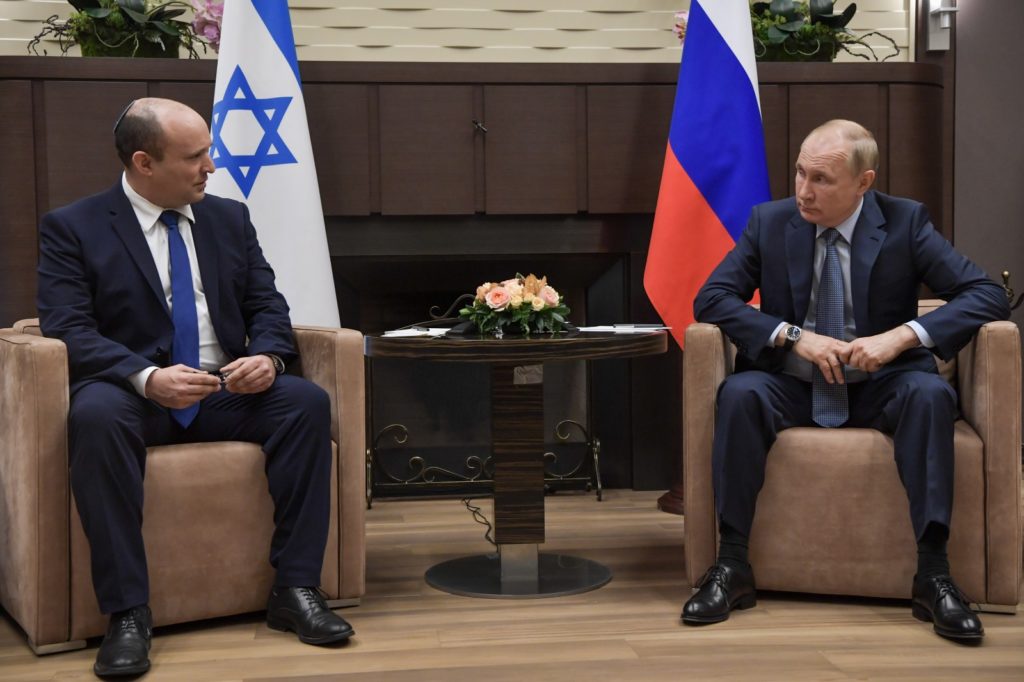
Israel—with unique connections to both Ukraine and Russia—is actively trying to mediate Europe’s largest conflict since World War II, but it isn’t just their special link to both sides that is spurring Israeli Prime Minister Naftali Bennett to get involved. “Even if the chance is not great—as soon as there is even a small opening, and we have access to all sides and the capability—I see this as our moral obligation to make every effort,” Bennett told the Israeli Cabinet on Sunday in comments released by his office. “As long as the candle is burning, we must make an effort and perhaps it will yet be possible to act.”
Bennett’s stirring words followed a surprise trip to Moscow to meet Russian President Vladimir Putin in person on Saturday. According to a press release from his office, Bennett met Putin in the Kremlin with National Security Advisor and Director of the National Security Council Dr. Eyal Hulata and other officials, after speaking by phone with Putin last Wednesday.
Bennett then continued his urgent diplomatic shuttle, speaking by phone with Ukrainian President Volodymyr Zelenskyy on Sunday for what an Israeli press release said was the third time in a day’s time. Zelenskyy, who is Jewish, posted to his Twitter feed that he and Bennett spoke after the latter’s meet with Putin, simply noting, “We continue dialogue.”
In addition to discussions with both sides in the war, Bennett also flew to Berlin on Saturday night. Israeli Prime Minister’s Office Arabic Spokesman Ofir Gendelman posted on Twitter photos of Bennett arriving in Berlin, noting in an Arabic post translated by Google that Bennett was there to meet with German Chancellor Olaf Scholz. This followed Scholz’ visit to Israel earlier in the week.
Bennett noted that “naturally”, he could not further discuss the content of his discussions. “I returned from Moscow and Berlin a few hours ago. I went there to assist the dialogue between all of the sides, of course with the blessing and encouragement of all players,” said Bennett in Sunday’s cabinet meeting.
“As you all know, the situation on the ground is not good. The human suffering is great and is liable to be much greater. There are also Israelis who need to return home and Jewish communities in distress that need help… We will continue to assist as needed.”
Israel is uniquely positioned to mediate the conflict. Israel is not only home to a very sizable Russian Jewish population, with Ukrainian Jewish immigrants as well, but the Jewish people have deep historical roots to both countries. For example, Ukraine is home to the gravesite of the Jewish religious leader Rebbe Nachman, a site for annual religious pilgrimage for Jews.
In addition, Israel has a complex relationship with Russia, with Moscow backing Syria and Iran—arch-enemies to Israel. However, Russia also has coordinated with Israel in Syrian airspace to avoid inadvertent conflict as both sides act militarily against third parties in the war-torn country.
In the meantime, Israel is facing a surge of Ukrainian immigrants and refugees. “We are prepared for a significant wave of immigration as a result of the situation,” said Bennett on Sunday, noting Israel’s immigration system is working on scenarios to be presented to the Security Cabinet. “…This is a challenge for the State of Israel but it is a challenge we have met in the past, time and again.
“At such moments, when the world is facing turmoil and Jews are no longer safe where they are, everyone is reminded how important it is that there is a home for Jews wherever they are; how important it is that we have the State of Israel.”
Bennett’s comments on the “moral obligation” to get involved in the conflict isn’t just hyperbole. The first orthodox religious Israeli Prime Minister, Bennett flew to Russia on the Sabbath—taking a religious exemption limited to extreme circumstances, including saving life and national defense.
The Israeli leader also is taking his own advice to heart. Last Thursday, Bennett was quoted by his office as saying in public remarks that “it’s the responsibility of the major players in the world to act rapidly to get the two sides out of the battlefield and on to the negotiation table.”
A former soldier, Bennett noted in his Thursday comments that he has personal history with war. “I participated in five or six different conflicts as a soldier, a commander and later on as a security cabinet member. It’s just a horrible thing. We in Israel have had our fair share of wars, and I can tell you one big lesson: Wars are easy to start and very difficult to finish.”
So far, it’s unclear if Bennett’s diplomatic efforts are yielding any results. Nonetheless, Bennett said on Thursday that there was still time. “Things are looking bad on the ground right now, but it’s important to understand that if world leaders don’t act quickly it can get much worse,” said Bennett. “I’m talking about untold loss of life, total destruction of Ukraine, millions of refugees and it’s not too late.”
(By Joshua Spurlock, www.themideastupdate.com, March 6, 2022)
